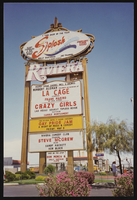Search the Special Collections and Archives Portal
Search Results
Allin Chandler oral history interview
Identifier
Abstract
Oral history interview with Allin Chandler conducted by Claytee D. White on February 05, 2013 for the Boyer Early Las Vegas Oral History Project. Chandler discusses being a member of Rancho High School's first graduating class of 1962, and his career as a teacher, a principal, and Executive Director for the Clark County Association of School Administrators.
Archival Collection

"Gay Pride Jam" marquee at the Riviera Hotel Casino, image 003: photographic print
Date
Archival Collection
Description
Image
Elmer H. Nighswonger oral history interview
Identifier
Abstract
Oral history interview with Elmer H. Nighswonger conducted by Larry Davis on April 02, 1976 for the Ralph Roske Oral History Project on Early Las Vegas. In this interview, Nighswonger discusses the history of the Las Vegas Fire Department and describes his experiences as a firefighter. Nighswonger then discusses the El Rancho Casino fire, and the effect that it had on Las Vegas, Nevada.
Archival Collection
Doris D. Evans oral history interview
Identifier
Abstract
Oral history interview with Doris Evans conducted by Lance Kenny on March 12, 1977 for the Ralph Roske Oral History Project on Early Las Vegas. In this interview Doris Evans discusses real estate, local hotels, early transportation, and social recreation. She also talks about nuclear testing, crime, environmental changes, and marriage and family life in Boulder City, Nevada and Las Vegas, Nevada.
Archival Collection
Helen Early oral history interview
Identifier
Abstract
Oral history interview with Helen Early conducted by Dale Forshee on February 26, 1979 and February 27, 1979 for the Ralph Roske Oral History Project on Early Las Vegas. Early talks about some of the first businesses in Las Vegas, Nevada, the initial development of the University of Nevada, Las Vegas, and the early nightclubs and casinos in the city. Early also discusses her work in establishing a school for disabled children.
Archival Collection
Juan Chacon oral history interview
Identifier
Abstract
Oral history interview with Juan Chacon conducted by Claytee White on August 28, 2012 for the African Americans in Las Vegas Collaborative Oral History Project. In this interview, Chacon discusses his upbringing, early life in Mexico and the United States, his education, segregation, anti-communism, becoming a U. S. citizen, his military career, and his work in Las Vegas, Nevada since retirement.
Archival Collection
Mildred Bardy oral history interview
Identifier
Abstract
Oral history interview with Mildred Bardy conducted by Deborah Grant on March 11, 1981 for the Ralph Roske Oral History Project on Early Las Vegas. In the interview Bardy discusses the famous celebrities who would come to purchase clothing at the specialty clothing department store where she worked, as well as the costumes that were made there for the Helldorado Parade. Bardy also discuss some of the changes in Las Vegas over time, particularly the changes in fashion styles.
Archival Collection
Richard L. Starr oral history interview
Identifier
Abstract
Oral history interview with Richard L. Starr conducted by Barrie S. Eddy on March 19, 1978 for the Ralph Roske Oral History Project on Early Las Vegas. Starr begins by discussing his career as an optical technician in Las Vegas, Nevada before transitioning into the service and repair industry for laundromats, and air conditioning. Starr describes how Las Vegas has changed, its population boom, and his hobby of prospecting. He also talks about flooding in Southern Nevada and housing development in Las Vegas.
Archival Collection
Charlotte Brascia oral history interview
Identifier
Abstract
Oral history interview with Charlotte Brascia conducted by Joe Mascellino on February 24, 1977 for the Ralph Roske Oral History Project on Early Las Vegas. Mascellino asks Brascia about social and cultural changes, the growth of different religions, Brascia’s brief presence in the airline industry, political presence in Las Vegas, Nevada, and rising crime rates. Brascia also specifically discusses her experience in the gaming and hospitality industry and how gaming operations have changed over time, particularly comparing gaming and hiring practices in the 1950s with those in the 1970s.
Archival Collection
Carol Forsythe oral history interview
Identifier
Abstract
Oral history interview with Carol Forsythe conducted by Sam Copeland on March 02, 1977 for the Ralph Roske Oral History Project on Early Las Vegas. Forsythe discusses her husband’s career as a firefighter, specifically facts about the growth of the Clark County Fire Department. Forsythe later talks about the different residences at which she and her family lived and the developmental changes to Las Vegas, Nevada since she first arrived. Forsythe then discusses the Helldorado tradition and its changes as well as her family’s Episcopalian faith and the churches they attended.
Archival Collection
